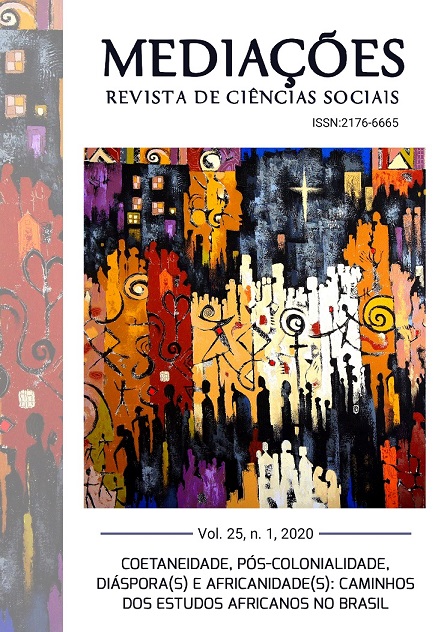Healthy eating, health and sustainability: a debate on social justice
DOI:
https://doi.org/10.5433/2176-6665.2020v25n1p188Keywords:
Food, Social Justice, Health, SustainabilityAbstract
From old and new epidemics to ensuring the quality of life, from economic development to the preservation of the planet, from poverty to redistribution and social justice, the term that groups these concerns is sustainability. One of the pillars of sustainability is the so-called adequate and healthy food, which encompasses a complex of dimensions, from the macro-relationships of production and distribution of goods to the community social microrelationships and the recognition of people as political subjects. In this sense, this concept of sustainability presupposes a theoretical and practical debate on social justice, which will be developed in this article. We will address, initially, the socio-cultural aspects of food, in reference to the construction of cultural identities and the identification of social inequalities, which are expressed in the concept of adequate and healthy food found in the National Policy on Food and Nutrition (PNAN, in Portuguese). This policy seeks to articulate food, health and quality of life having as principle the adequate and quality food understood as a human right. Finally, we will reflect on social justice based on the articulation between food policies and social justice theories, focusing on the debate proposed by Nancy Fraser.Downloads
References
BRASIL. Lei nº 11.346, de 15 de setembro de 2006. Cria o Sistema Nacional de Segurança Alimentar e Nutricional - SISAN com vistas em assegurar o direito humano à alimentação adequada e dá outras providências. Brasília: Presidência da República, 2006.
BRASIL. Ministério da Saúde. Guia alimentar para a população brasileira. 2. ed. Brasília: MS, 2014.
BRASIL. Ministério da Saúde. Portaria nº 710, de 10 de junho de 1999. Aprova a Política Nacional de Alimentação e Nutrição - PNAN e dá outras providências. Brasília: Sistema de Legislação da Saúde, 1999.
BRASIL. Ministério da Saúde. Portaria nº 2.715, de 17 de novembro de 2011. Atualiza a Política Nacional de Alimentação e Nutrição. Brasília: Sistema de Legislação da Saúde, 2011.
BURLANDY, Luciene; COSTA, Rosana Salles. Segurança alimentar e nutricional: concepções e desenhos de investigação. In: KAC, Gilberto; SICHIERI, Rosely; GIGANTE, Denise Petrucci (org.). Epidemiologia nutricional. Rio de Janeiro: Fiocruz: Atheneu, 2007. p. 485-501.
CNDSS - COMISSÃO NACIONAL SOBRE DETERMINANTES SOCIAIS DA SAUDE. As causas sociais das iniquidades em saúde no Brasil. Brasília: CNDSS, 2008.
DANIEL, Jungla Maria Pimentel; CRAVO, Veraluz Zicarelli. Valor social e cultural da alimentação. In: GARCIA, Rosa Wanda Diez; CANESQUI, Ana Maria. (org.). Antropologia e nutrição: um diálogo possível. Rio de Janeiro: Fiocruz, 2005. p. 57-68.
DANIELS, Norman. Just health: meeting health needs fairly. New York: Cambridge University Press, 2008.
FRASER, Nancy; HONNETH, Axel. Redistribution or recognition?: a political-philosophical exchange. London: Verso, 2003.
FORST, Rainer. The right to justification: elements of a constructivist theory of justice. New York: Columbia University Press, 2012.
GUIMARÃES, Roberto Pereira; FONTOURA, Yuna Souza dos Reis. Muito ruído e poucas vozes: os discursos na Rio+20 e a governança global para o desenvolvimento sustentável. Revista Idéias, Campinas, v. 3, n. 2, p. 31-54, jul./dez. 2012.
HERNÁNDEZ, Jesús Contreras. Patrimônio e globalização: o caso das culturas alimentares. In: GARCIA, Rosa Wanda Diez; CANESQUI, Ana Maria. (org.). Antropologia e nutrição: um diálogo possível. Rio de Janeiro: Fiocruz, 2005. p. 129-145.
IBGE. Pesquisa nacional por amostra de domicílios - PNAD. Rio de Janeiro: IBGE, 2014.
JACOBS, Andrew; RICHTEL, Matt. Como a grande indústria viciou o Brasil em junk food. New York Times, New York, 16 set. 2017. Disponível em: https://www.nytimes.com/2017/09/16/health/brasil-junk-food.html. Acesso em: 21 mar. 2019.
LEÃO, Marília Mendonça; CASTRO, Inês Rugani Ribeiro. Políticas públicas de alimentação e nutrição. In: KAC, Gilberto; SICHIERI, Rosely; GIGANTE, Denise Petrucci (org.). Epidemiologia nutricional. Rio de Janeiro: Fiocruz: Atheneu, 2007. p. 519-535.
MACIEL, Maria Eunice. Identidade cultural e alimentação. In: GARCIA, Rosa Wanda Diez; CANESQUI, Aana Maria (org.). Antropologia e nutrição: um diálogo possível. Rio de Janeiro: Fiocruz, 2005. p. 49-55.
ONU - ORGANIZAÇÃO DAS NAÇÕES UNIDAS. Agenda 21: United Nations Conference on Environment & Development. Rio de Janeiro: United Nations, 1992. Disponível em: https://sustainabledevelopment.un.org/content/documents/Agenda21.pdf. Acesso em: 21 mar. 2019.
ONU - ORGANIZAÇÃO DAS NAÇÕES UNIDAS. Declaração de Joanesburgo sobre desenvolvimento sustentável. Joanesburgo: United Nations, 2002. Disponível em: www.mma.gov.br/estruturas/agenda21/_arquivos/joanesburgo.doc. Acesso em: 21 mar. 2019.
ONU - ORGANIZAÇÃO DAS NAÇÕES UNIDAS The future we want: outcome of the United Nations conference on sustainable development. Rio de Janeiro: United Nations, 2012. Disponível em: https://sustainabledevelopment.un.org/content/documents/733FutureWeWant.pdf. Acesso em: 21 mar. 2019.
ONU - ORGANIZAÇÃO DAS NAÇÕES UNIDAS. Transformando nosso mundo: a agenda 2030 para o desenvolvimento sustentável. [Nova York: PNDU], 2015. Disponível em: https://www.undp.org/content/dam/brazil/Agenda2030-completo-site%20(1).pdf. Acesso em: 3 jan. 2020.
PINHEIRO, Anelise Rizzolo de Oliveira; CARVALHO, Maria de Fátima Cruz Correia. Transformando o problema da fome em questão alimentar e nutricional: uma crônica desigualdade social. Ciência e saúde coletiva, Rio de Janeiro, v. 15, n. 1, p. 121-130, jan. 2010. Disponível em: http://www.scielo.br/scielo.php?script=sci_arttext&pid=S1413-81232010000100018&lng=en&nrm=iso. Acesso em: 21 mar. 2019.
RAWLS, John. Uma teoria da justiça. São Paulo: Martins Fontes, 2008.
RAWLS, John. Justiça como equidade. São Paulo: Martins Fontes, 2003.
SEN, Amartya. The idea of justice. Massachusetts: Belknap Press of Harvard University Press, 2009.
SEN, Amartya. Desenvolvimento como liberdade. São Paulo: Companhia das Letras, 2000.
SEN, Amartya. Well-being, agency and freedom: The Dewey Lectures 1984. Journal of Philosophy, New York, v. 82, n. 4, p. 169-221, apr. 1985.
WHO - WORLD HEALT ORGANIZATION. Adelaide statement on health in all policies: moving towards a shared governance for health and well-being. Adelaide, South Australia: WHO, 2010.
Downloads
Published
How to Cite
Issue
Section
License
Copyright (c) 2020 Tatiana Andrade Barbarini, Camila Gonçalves de Mario

This work is licensed under a Creative Commons Attribution 4.0 International License.
Copyright on articles published in Mediações belongs to the author(s): in the case of partial or entire republication of the original publication, we ask author(s) to indicate the original publication in the periodical.
Mediações uses the Creative Commons Attribution 4.0 International license, which allows Open Access, enabling any user to read, download, copy and disseminate its content so long as adequately referenced.
The opinions expressed by the author(s) are their sole responsibility.
































